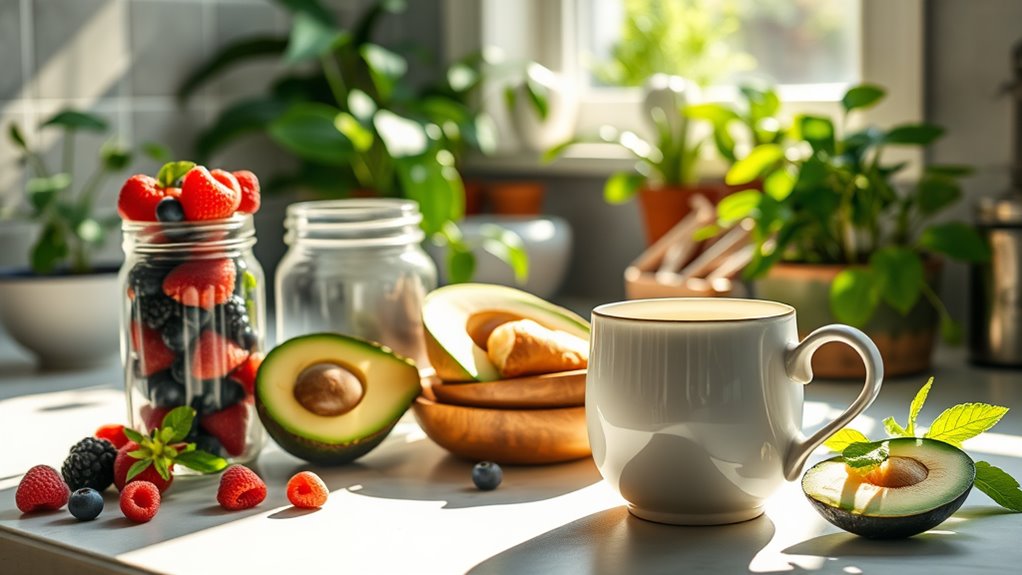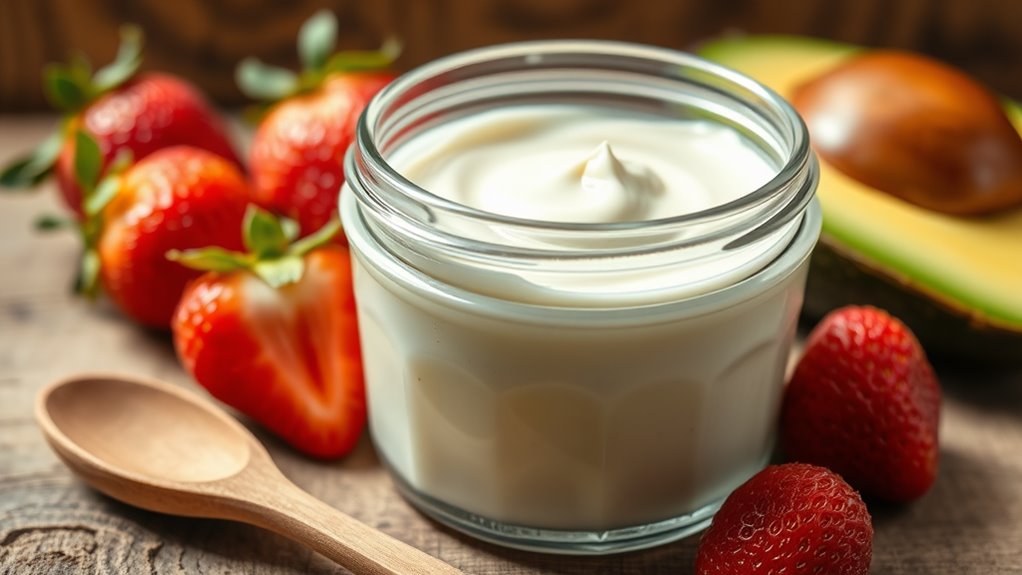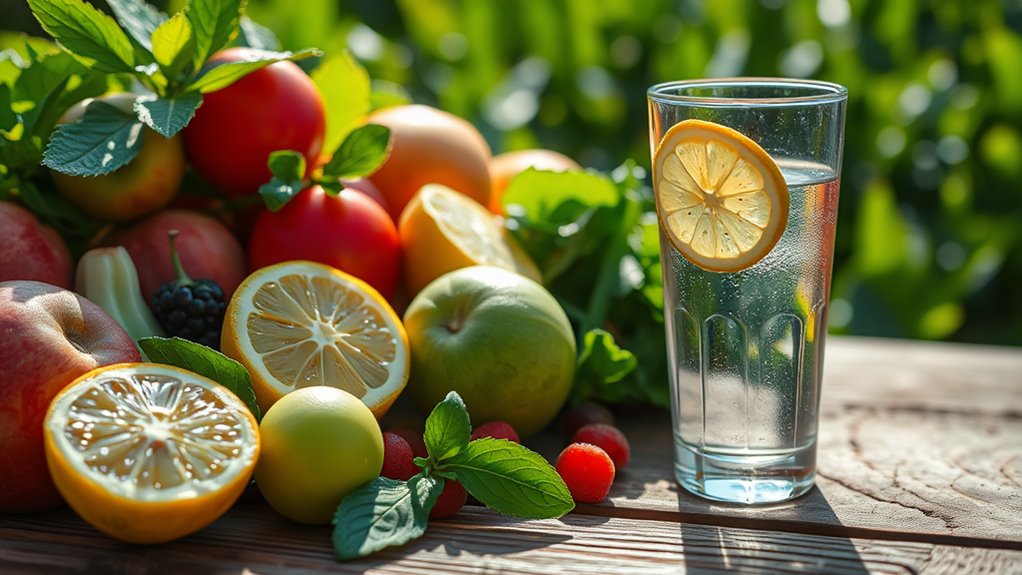Boost Collagen Naturally With This Morning Habit
To boost collagen naturally, start your morning with hydration and nutrient-rich foods. Drink water as soon as you wake up and consider a breakfast packed with vitamin C, like citrus fruits or berries, along with protein sources such as eggs or Greek yogurt. Add in nuts and seeds for healthy fats. Don’t forget to practice mindfulness or light exercise to kickstart circulation and reduce stress. Stick around for more tips on enhancing your collagen levels!
Key Takeaways
- Hydrate immediately upon waking to kickstart collagen synthesis and overall body functions.
- Incorporate vitamin C-rich foods like citrus fruits or berries into your breakfast for antioxidant support.
- Engage in light exercise to enhance circulation and nutrient delivery to skin cells.
- Practice deep breathing or meditation to reduce stress, promoting better collagen production.
- Add bone broth or collagen peptides to your morning meal for a direct collagen boost.
The Importance of Collagen for Skin and Joint Health
Collagen plays an essential role in maintaining your skin’s elasticity and joint health, so understanding its importance is critical.
As your body ages, collagen production declines, leading to wrinkles and joint discomfort. To combat this, you need to adopt a collagen boost habit. Incorporating nutrient-dense foods rich in vitamin C, such as citrus fruits and leafy greens, can stimulate collagen synthesis. Additionally, consider incorporating bone broth or collagen peptides into your diet; these provide the building blocks necessary for collagen formation. Staying hydrated and avoiding excessive sun exposure also help preserve your skin’s natural collagen levels. Moreover, engaging in specific morning rituals like stretching or yoga can further enhance collagen production by improving blood circulation.
Morning Rituals to Enhance Collagen Production
Starting your day with intentional morning rituals can markedly boost collagen production. By incorporating these practices, you can enhance your skin’s elasticity and overall health.
-
Hydrate immediately upon waking to kickstart your body’s functions.
-
Practice deep breathing* or meditation to *reduce stress, which can deplete collagen.
-
Engage in light exercise**** to promote circulation and nutrient delivery.
-
Incorporate facial massage to stimulate collagen-producing cells.
-
Set a positive intention for the day, fostering a mindset that supports overall wellness.
These rituals not only promote collagen synthesis but also create a foundation for a vibrant day ahead. Additionally, staying properly hydrated can help combat aging by maintaining skin moisture and elasticity, which are crucial for collagen production.
Nutrient-Rich Foods to Incorporate Into Your Breakfast
What can you add to your breakfast to naturally boost collagen production? Consider including foods rich in vitamin C, like citrus fruits or berries. These antioxidants not only protect your skin but also support collagen synthesis.
Next, incorporate leafy greens, such as spinach or kale, which provide essential nutrients for skin health. Don’t forget about protein; adding eggs, Greek yogurt, or a scoop of collagen peptides can enhance your body’s collagen supply.
Nuts and seeds, particularly almonds and chia seeds, offer healthy fats and zinc, both vital for collagen formation. Finally, add a splash of bone broth to your smoothie or oatmeal for an extra collagen kick. Additionally, incorporating collagen-rich foods into your diet can significantly enhance overall skin elasticity and youthfulness.
Hydration’s Role in Collagen Synthesis
While you may focus on nutrient-rich foods for collagen production, hydration plays an important role in the process as well. Adequate water intake not only helps transport nutrients but also supports skin elasticity and overall health.
When your body is well-hydrated, it can more effectively synthesize collagen, leading to a more youthful appearance. Here are some key points to take into account:
- Water aids in the production of collagen fibers.
- Dehydration can lead to skin dryness and reduced elasticity.
- Proper hydration supports cellular functions crucial for collagen synthesis.
- Drinking water boosts nutrient absorption necessary for collagen.
- Hydration helps flush out toxins that can damage collagen.
- Consuming hydrating beverages can enhance your skin’s moisture levels and overall appearance.
Make hydration a priority in your daily routine to optimize your body’s collagen production.
Lifestyle Changes to Support Collagen Levels
Maintaining adequate hydration sets the foundation for healthy collagen production, but lifestyle changes can further enhance your body’s ability to synthesize this essential protein.
Prioritize a balanced diet rich in vitamin C, zinc, and amino acids, as these nutrients are crucial for collagen formation. Incorporate foods like citrus fruits, nuts, and leafy greens into your meals.
Additionally, consider reducing sugar and processed foods, which can degrade collagen over time. Regular exercise boosts circulation, delivering nutrients to skin cells, while quality sleep allows your body to repair and regenerate.
Finally, manage stress through mindfulness or yoga, as chronic stress can hinder collagen production. Including essential nutrients like protein, biotin, and iron in your diet can also support overall hair health and growth.
Frequently Asked Questions
How Long Does It Take to See Collagen Improvement?
You’ll typically notice collagen improvement within four to twelve weeks, depending on your lifestyle and dietary choices. Consistency in your routine is key to achieving ideal results and enhancing your skin’s elasticity and overall appearance.
Can Collagen Supplements Replace Natural Production?
Collagen supplements can enhance your skin’s appearance, but they can’t fully replace your body’s natural production. Relying solely on supplements might limit your skin’s potential, so focus on a balanced diet and lifestyle for ideal results.
Are There Specific Age-Related Collagen Concerns?
As you age, collagen production declines, leading to wrinkles, sagging skin, and joint issues. You might notice these changes in your 20s and 30s, so addressing collagen concerns early can help maintain your youthful appearance and mobility.
Does Stress Affect Collagen Levels?
Yes, stress greatly affects collagen levels. It triggers cortisol release, which can lead to collagen breakdown. Managing stress through mindfulness or exercise can help maintain your collagen production and overall skin health.
Can Exercise Boost Collagen Production?
Yes, exercise can boost collagen production. When you engage in physical activity, your body increases blood flow and nutrients, stimulating collagen synthesis. Regular workouts help maintain skin elasticity and overall health, contributing to a youthful appearance.





